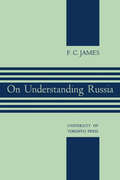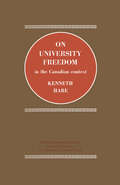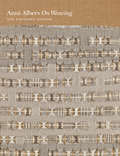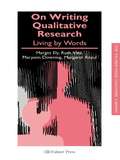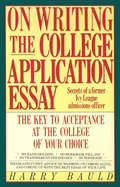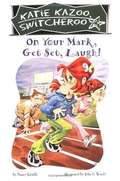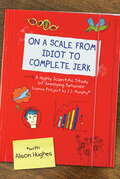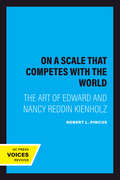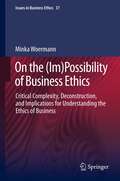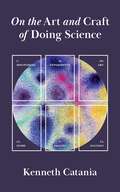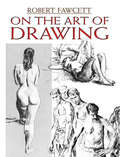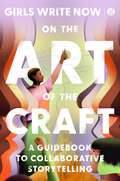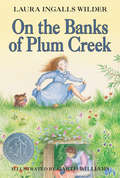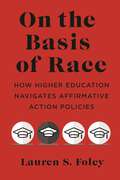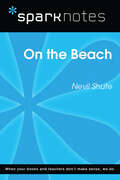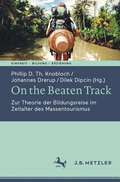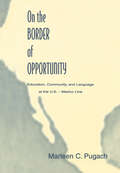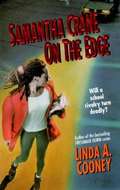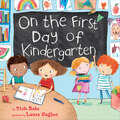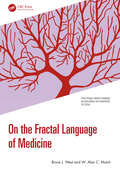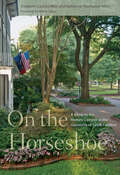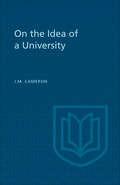- Table View
- List View
On Understanding Russia
by F. JamesAs an outstanding educator and economist, Dr. F. Cyril James is particularly well qualified to observe modern Russia, and to comment upon it for Western readers. While he disclaims any right to speak with authority on the basis of his recent tour, the reader will quickly realize that he was actually given exceptional opportunities to see Soviet life, economy, and education – visiting some places that few foreigners have seen – and that, as a trained observer, he was able to draw fully from his experiences. As Dr. James points out, "it is imperative that we should learn all that we can about the U.S.S.R. in order to understand its people – their habits, their ambitions, and their thoughts." He describes most vividly how the system of research institutions and university education provides incentive and then a very fully occupied life for those who are gathered into it. The comparisons of university budgets, salaries, and student expenses with those of North America are revealing. Dr. James tells also of the interesting developments from Mr. Khrushchev's proposal that students should work in factories or on farms before going on to university.
On University Freedom in the Canadian Context
by Kenneth HareThe universities of Canada are now expanding rapidly and becoming very costly to run and equip. Increasingly the bill is borne by the public exchequers, federal and provincial. What then should be the proper relationship between government and universities if university freedom is to be preserved? This book, based on the Plaunt Lectures given at Carleton University in 1967, discusses the various aspects of the question. The author for example, discusses the British solution of a buffer committee between government and university, and the American concept of a lay board of regents which has jurisdiction over the university system in the name of the people. He suggests that the best device is for the universities themselves to form a strong cooperative body and for the state to arm this body with statutory instruments. Most provinces now have a Provincial Advisory Committee and the author proposes that the staff needed to assess and scrutinize budgets for university funds equitably should be under the control of this committee rather than the provincial Ministers. As a collateral to the question of university freedom Dr. Hare also asks "whose freedom is it?" and in answering this he takes up the question of the unrest on campuses today among the students, and the trend toward more student participation in university administration. He supports the recent action taken by many Canadian universities of allowing student membership in their Senate. At a time when the problem of university freedom and control is one of the most controversial in the academic world, this study will be of interest to all members of that community, and to anyone in federal and provincial politics.
On Weaving
by Nicholas Fox Weber Anni Albers Manuel Cirauqui T Ai SmithThe classic book on the art and history of weaving—now expanded and in full colorWritten by one of the twentieth century’s leading textile artists, this splendidly illustrated book is a luminous meditation on the art of weaving, its history, its tools and techniques, and its implications for modern design. First published in 1965, On Weaving bridges the transition between handcraft and the machine-made, highlighting the essential importance of material awareness and the creative leaps that can occur when design problems are tackled by hand.With her focus on materials and handlooms, Anni Albers discusses how technology and mass production place limits on creativity and problem solving, and makes the case for a renewed embrace of human ingenuity that is particularly important today. Her lucid and engaging prose is illustrated with a wealth of rare and extraordinary images showing the history of the medium, from hand-drawn diagrams and close-ups of pre-Columbian textiles to material studies with corn, paper, and the typewriter, as well as illuminating examples of her own work.Now available for a new generation of readers, this expanded edition of On Weaving updates the book’s original black-and-white illustrations with full-color photos, and features an afterword by Nicholas Fox Weber and essays by Manuel Cirauqui and T’ai Smith that shed critical light on Albers and her career.
On Writing Qualitative Research: Living by Words (Teachers' Library #Vol. 12)
by Ruth Vinz Margaret Anzul Margot Ely Maryann DowningThis text is both about writing up qualitative research and is itself a qualitative study. The written reflections of students on the writing process and the interpretations and presentations of their findings provide a base of data which the authors have, in turn, analyzed and incorporated into their text. They have added accounts of their own experiences, and those of their colleagues and other published authors. All of these are woven into a theoretical framework that discusses them in detail.
On Writing the College Application Essay
by Harry BauldVital information for every college applicant. A former Ivy League admissions officer provides tough and funny advice on coming up with the best essay possible.
On Your Mark, Get Set, Laugh! (Katie Kazoo Switcheroo #13)
by Nancy KrulikWhen fourth-grade Katie turns into her unfair track coach, she gives all the kids on the team a chance to compete, including the slowest runner in her class.
On a Scale from Idiot to Complete Jerk
by Alison HughesWhen grade-eight science-project time rolls around, J.J. Murphy skips the beakers and the papiermâché and dives into research about jerks. And idiots. But mostly jerks. By his own estimation, his science project, On a Scale from Idiot to Complete Jerk, is groundbreaking, exhaustive, highly scientific and seriously worthy of bonus marks. Beginning with the dawn of humankind and concluding conclusively with a very cool pie chart, the project dissects the elements of jerkosity through extensive case studies and scientific illustrations. It explores the who, what, when, why and how of jerks and, more important, peppers the lively research with sciencey-looking graphs and charts that reveal a lot about J.J., his family and friends, and the jerks of this world.
On a Scale that Competes with the World: The Art of Edward and Nancy Reddin Kienholz
by Robert L. PincusThis title is part of UC Press's Voices Revived program, which commemorates University of California Press’s mission to seek out and cultivate the brightest minds and give them voice, reach, and impact. Drawing on a backlist dating to 1893, Voices Revived makes high-quality, peer-reviewed scholarship accessible once again using print-on-demand technology. This title was originally published in 1990.This title is part of UC Press's Voices Revived program, which commemorates University of California Press’s mission to seek out and cultivate the brightest minds and give them voice, reach, and impact. Drawing on a backlist dating to 1893, Voices Revived</DIV
On the (Im)Possibility of Business Ethics: Critical Complexity, Deconstruction, and Implications for Understanding the Ethics of Business
by Minka WoermannCorporations, and the environments in which they operate, are complex, with changing multiple dimensions, and an inherent capacity to evolve qualitatively. A central premise of this study is that a postmodern reading of ethics represents an expression of, and an engagement with, the ethical complexities that define the business landscape. In particular, the deconstructive philosophy of Jacques Derrida offers a non-trivial reading of a complex notion of ethics, and thereby helps us to develop the skills necessary to critique and intervene in our practices, and to develop robust strategies for living in the absence of prescriptive ethical frameworks. Although a central premise of this study is that substantive ethical claims can only be generated within a given context, the study nevertheless presents readers with a meta-position that illustrates the type of considerations that should inform ethical reflection from a complexity perspective. In order to illustrate the value that this meta-position holds for business ethics, these considerations are explored in terms of the implications that they hold for our understanding of corporate social responsibility, for the practice of responsible management and leadership practices, and for teaching business ethics.
On the Art and Craft of Doing Science
by Kenneth CataniaA scientist&’s personal reflections on how to harness creativity and curiosity to generate new ideas and discover the unexpectedLike any creative endeavor, science can be a messy and chaotic affair. On the Art and Craft of Doing Science shares the creative process of an innovative and accomplished scientist, taking readers behind the scenes of some of his most pioneering investigations and explaining why the practice of science, far from being an orderly exercise in pure logic, is a form of creative expression like any other art.Kenneth Catania begins by discussing how ideas set the stage for scientific breakthroughs and goes on to describe ways to approach experimental design. He sheds light on the importance of art in making discoveries and demonstrates how to find and tell a compelling story about a scientific result while accurately communicating its findings. What role does failure play in science? Is it possible to fail better? How do you define success? Catania provides insights to these and other questions, along the way sharing the lessons he&’s learned from diverse figures ranging from science philosopher Thomas Kuhn to novelist Stephen King.Blending illuminating historical examples with insights from Catania&’s own groundbreaking research in biology and neuroscience, On the Art and Craft of Doing Science draws parallels with art and writing to reveal the creative side to the practice of good science.
On the Art of Drawing (Dover Art Instruction Ser.)
by Robert FawcettWith this helpful and informative guide, a leading American illustrator offers insights into how serious beginners can become sketch masters. It combines a focus on the nature and importance of technique with practical suggestions for developing drawing skills with a variety of tools, including felt pen, pencil, crayon, brush and ink, charcoal, casein, tempera, and wash.Norman Rockwell praised this book as "a real contribution not only to illustration, but to art." Rockwell and author Robert Fawcett were founding faculty members of the Famous Artists School, a correspondence course that has coached legions of professionals and amateurs. Known as the "Illustrator's Illustrator," Fawcett stresses design and composition in his step-by-step demonstrations, which feature 100 illustrations. His realistic depictions of landscapes and human figures convey solid fundamentals of drawing that every artist, illustrator, student, and hobbyist needs to know.
On the Art of the Craft: A Guidebook to Collaborative Storytelling
by Girls Write NowA writing companion, inspirational guide to the craft, and anthology featuring interactive multi-genre work from the acclaimed organization on its twenty-fifth anniversary.We all have stories to tell, but not everyone gets the mentoring and training or encouragement to become a great storyteller. Founded a quarter century ago, Girls Write Now has empowered young women and gender-expansive youth to harness their creative talents, gaining confidence, skills, and a community supporting them in sharing stories the world needs to hear.This hands-on guide—conceived of and written and edited by the young people of Girls Write Now—draws from the organization’s dynamic curriculum and the writers’ own personal experiences spanning decades. It offers aspiring writers the tools they need to develop their craft—including tips, insight, and advice on the writing and publishing process as well as critical thinking about the future of storytelling.With this handbook, readers everywhere can equip themselves to shape their life stories, and become the writers and leaders they dream of being.
On the Banks of Plum Creek
by Laura Ingalls Wilder Garth WilliamsThe fourth book in Laura Ingalls Wilder's treasured Little House series, and the recipient of a Newbery Honor--now available as an ebook! This digital version features Garth Williams's classic illustrations, which appear in vibrant full color on a full-color device and in rich black-and-white on all other devices.The adventures of Laura Ingalls and her family continue as they leave the prairie and travel in their covered wagon to Walnut Grove, Minnesota. Here they settle in a new home made of sod beside the banks of Plum Creek. Soon Pa builds a wonderful new little house with real glass windows and a hinged door. Laura and her sister Mary go to school, help with the chores, and fish in the creek. At night everyone listens to the merry music of Pa's fiddle. Misfortunes come in the form of a grasshopper plague and a terrible blizzard, but the pioneer family works hard together to overcome these challenges.The nine Little House books are inspired by Laura's own childhood and have been cherished by generations of readers as both a unique glimpse into America's frontier history and as heartwarming, unforgettable stories.Correlates to the Common Core State Standards in English Language Arts
On the Basis of Race: How Higher Education Navigates Affirmative Action Policies
by Lauren S. FoleyHow universities can navigate affirmative action bans to protect diversity in student admissionsDiversity in higher education is under attack as the Supreme Court considers the future of affirmative action, or race-conscious admissions practices, at American colleges and universities. In On the Basis of Race, Lauren S. Foley sheds light on our current crisis, exploring the past, present, and future of this contentious policy.From Brown v. Board of Education in the mid-twentieth century to the current Students for Fair Admissions v. Harvard and University of North Carolina, Chapel Hill, Foley explores how organizations have resisted and complied with public policies regarding race. She examines how admissions officers, who have played an important role in the long fight to protect racial diversity in higher education, work around the law to maintain diversity after affirmative action is banned. Foley takes us behind the curtain of student admissions, shedding light on how multiple universities, including the University of Michigan, have creatively responded to affirmative action bans. On the Basis of Race traces the history of a controversial idea and policy, and provides insight into its uncertain future.
On the Battlefield of Merit: Harvard Law School, the First Century
by Daniel R. CoquilletteHarvard Law School pioneered educational ideas, including professional legal education within a university, Socratic questioning and case analysis, and the admission and training of students based on academic merit. On the Battlefield of Merit offers a candid account of a unique legal institution during its first century of influence.
On the Beach (SparkNotes Literature Guide Series)
by SparkNotesOn the Beach (SparkNotes Literature Guide) by Nevil Shute Making the reading experience fun! Created by Harvard students for students everywhere, SparkNotes is a new breed of study guide: smarter, better, faster. Geared to what today's students need to know, SparkNotes provides: *Chapter-by-chapter analysis *Explanations of key themes, motifs, and symbols *A review quiz and essay topicsLively and accessible, these guides are perfect for late-night studying and writing papers
On the Beaten Track: Zur Theorie der Bildungsreise im Zeitalter des Massentourismus (Kindheit – Bildung – Erziehung. Philosophische Perspektiven)
by Johannes Drerup Phillip D. Th. Knobloch Dilek DipcinWir leben in einer Welt der ausgetretenen Pfade. Es gibt kaum ein Ort auf diesem Planeten – vom Mount Everest Base Camp bis zur Antarktis –, der nicht in ein Objekt und Produkt möglicher touristischer Erfahrung transformiert wurde oder wird. In der globalen Praxis und im weltumspannenden sozioökonomischen System des modernen Massentourismus spiegeln sich wie in einem Brennglas die Ambivalenzen, Paradoxien und Widersprüche (post-)moderner Formen der individuellen und kollektiven Lebensführung und Selbstverständigung. Dies gilt auch für die in diesem Band diskutierten Zusammenhänge zwischen Reisen und Bildung, die nicht zu trennen sind von Formen der sozialer Distinktion und Ungleichheit, von Hierarchisierungen und Ranglisten und von Macht und Politik.
On the Border of Opportunity: Education, Community, and Language at the U.s.-mexico Line (Sociocultural, Political, and Historical Studies in Education)
by Marleen C. PugachIn 1993, the author set out to try and gain some understanding about school and community in Havens, New Mexico--a place where she had the opportunity to be immersed in border culture, where she could learn how the border figured into everyday life, and where she could pay uninterrupted attention to the issues as they occurred in the personal and professional lives of those who taught in and administered the schools--and in the lives of the students who studied there. This book offers an interpretation that is disciplined by the long hours, days, and months spent in Havens, and by the personal stance the author brings to the study of a place and its people. This book tells the story of Havens from the perspective of what it is, of the present in all of its complexity, and as a window on what might exist in the future in this border community. It begins with a description of Havens and its inevitable interdependence with its Mexican neighbors, followed by an introduction of three "cultural mediators"--two students and one teacher from Havens High School. Focusing on the relationship between the use of Spanish and English, the language landscape in the community and in the schools is laid out. This is followed by a specific description of the development of bilingual education programs in the district, and an introduction of the social structure of the high school, describing the students' interactions across cultural lines. The final chapter presents an alternative metaphor for thinking about the border and identifies markers of opportunity that already exist in Havens as it works toward defining what it means to be a bicultural and binational community.
On the Digital Humanities: Essays and Provocations
by Stephen RamsayA witty and incisive exploration of the philosophical conundrums that animate the digital humanities Since its inception, the digital humanities has been repeatedly attacked as a threat to the humanities: warnings from literary and cultural theorists of technology overtaking English departments and the mechanization of teaching have peppered popular media. Stephen Ramsay&’s On the Digital Humanities, a collection of essays spanning the personal to the polemic, is a spirited defense of the field of digital humanities. A founding figure in what was once known as &“humanities computing,&” Ramsay has a well-known and contentious relationship with what is now called the digital humanities (DH). Here Ramsay collects and updates his most influential and notorious essays and speeches from the past fifteen years, considering DH from an array of practical and theoretical perspectives. The essays pursue a broad variety of themes, including the nature of data and its place in more conventional notions of text and interpretation, the relationship between the constraints of computation and the more open-ended nature of the humanities, the positioning of practical skills and infrastructures in both research and pedagogical contexts, the status of DH as a program for political and social action, and personal reflections on the author&’s journey into the field as both a theorist and a technologist. These wide-ranging essays all center around one idea: that DH not forsake its connection to the humanities. While &“digital humanities&” may sound like an entirely new form of engagement with the artifacts of human culture, Ramsay argues that the field well reveals what is most essential to humanistic inquiry.
On the Edge (Samantha Crane #3)
by Linda A. CooneyTHE RACE FOR TOP HONORS IS HARD ON EVERYONE For the first time, she's caught between two guys, and caught in a lie to protect someone else. She's pushing herself hard to win a coveted award. Will she get what she wants—or lose out because of dirty tricks? Sam's best friend has a talent for getting in trouble. She needs Sam's help—but will their friendship suffer? He is the school sports star. He plays to win—but he might be trying too hard for his own good. Being a mom who's a dedicated cop isn't easy—especially when your daughter has to pay for your actions.
On the First Day of Kindergarten: A First Day of School Book for Kids
by Tish RabePerfect for nervous/excited kids about to go to kindergarten (and their parents!). This engaging adaptation of “The Twelve Days of Christmas” convinces parents and children alike that there is no place cooler than a kindergarten classroom.On the first day of kindergarten, there’s so much to do! From making new friends to jumping rope in gym to riding the bus to school, there are lots of exciting firsts to look forward to.Even though saying good-bye to Mom and Dad is hard, when the school bus pulls up, it’s time to begin kindergarten fun.Share at home along with such books as Clover Kitty Goes to Kittygarten and Kindergarten, Here I Come!Tish Rabe is a seasoned children’s book author with over 160 titles, including ones for Sesame Street and Curious George, under her belt. Like Natasha Wing with The Night Before Christmas, Rabe puts a novel spin on a first-day-of-school classic with On the First Day of Kindergarten.And don't miss the follow-up: On the First Day of First Grade!
On the Fractal Language of Medicine (Fractional Order Thinking in Exploring the Frontiers of STEM)
by Bruce J. West W. Alan MutchOn the Fractal Language of Medicine bridges a very clear gap among the knowledge gained over the last 20 years in the physical and life sciences on network theory, organ synchronicity and communication, the understanding of fractal signatures in health and disease and the importance of fractional calculus in integrating these concepts.The authors opine that the field of medicine has not appreciated this hard-won knowledge and has suffered greatly as a result. This book addresses this perceived deficiency by introducing medical researchers, clinicians, residents, first-year medical students and members of allied fields to the work of the so-called hard sciences. It seeks to facilitate effective communication between empiricists and theorists by making interdisciplinary efforts to explain complex mathematical concepts to physicians and, equally important, to elucidate complex medical concepts to physicists or mathematicians.This book will be of great interest to medical students, professionals and academics, as well as students and researchers of applied mathematics, especially those interested in fractional calculus and fractals.
On the Horseshoe: A Guide to the Historic Campus of the University of South Carolina
by Elizabeth Cassidy West Katharine Thompson AllenA complete guide to the historic campus, featuring archival photos along with a close look at the structures and the people who inhabited them.Founded in 1801 as South Carolina College, the University of South Carolina is one of the nation’s oldest public colleges. Located in the heart of downtown Columbia and bound by Sumter, Pendleton, Bull, and Greene Streets, this historic landscape, known today as the Horseshoe, has both endured and prospered through more than two centuries of South Carolina’s often-turbulent history.In On the Horseshoe: A Guide to the Historic Campus of the University of South Carolina, Elizabeth Cassidy West and Katharine Thompson Allen offer a comprehensive, up-to-date overview of the historic Horseshoe. So much more than just a walking tour of Carolina’s historic original campus, On the Horseshoe features a wealth of archival photographs and drawings dating back to the nineteenth century and also provides a close look at the Horseshoe’s structures as well as the men and women who lived, worked, and studied in them.A numbered map with corresponding descriptions locates more than two dozen structures on the original campus and includes the history of each one, the important events that took place there, and its current use. An accompanying Web site (www.sc.edu/horseshoe) provides additional information and images for those who wish to further their knowledge of the university’s history. Walter Edgar, Neuffer Professor of Southern Studies Emeritus and Distinguished Professor Emeritus of History at USC, provides a foreword.“Whether a native of Columbia, a South Carolina alumnus or a visitor to the Palmetto State, On the Horseshoe is a must-read for those interested in one of the most storied and historic facets of South Carolina’s capital city.” —John M. Sherrer III, Historic Columbia Foundation“Allen and West offer a well-researched and beautifully written narrative that highlights the physical and social histories of the campus. They seamlessly chronicle the construction of buildings, institutional traditions, the Civil War, slavery, Jim Crow, the civil rights movement, influential people, and ongoing memorialization efforts that showcase the rich and complex history of the university. This is an essential book for anyone interested in the University of South Carolina history, or southern history as a whole.” —Kelley Deetz, President’s Commission on Slavery and the University, University of Virginia
On the Idea of a University
by J. M. CameronStarting from Newman`s concept of the university as a place of liberal education, Professor Cameron examines how today`s university functions, what its aims should be and what its strengths and deficiencies are, and presents some proposals for reform. He argues that liberal education, in which knowledge is pursued for its own sake as well as for the advantages it may bring, should remain the core of university studies, although he emphasizes that natural science and the technologies, as well as the traditional art subjects, may be studied liberally in the university. In the course of a rich and broad-ranging discussion, he singles out parasensical discourse – a kind of curious verbal play, neither sense nor nonsense, designed to inculcate attitudes, not convey information – as a symptom of the crisis in the university today. Cameron`s trenchant analysis of it and of the serious ills that it represents is particularly relevant to an understanding of the controversy surrounding modern university education.The four lectures in this volume were originally delivered to mark the sesquicentennial of the University of Toronto and the 125th anniversary of Saint Michael`s College. The occasion, Cameron writes, `gave me a chance to consider the nature and spirit of the institution within which I have spent most of my working life.At a time when the value of university education is being questioned, Cameron provides a fresh perspective on the university`s purpose, its form, and its future. The volume is published in association with the University of Saint Michael`s College by University of Toronto Press.
